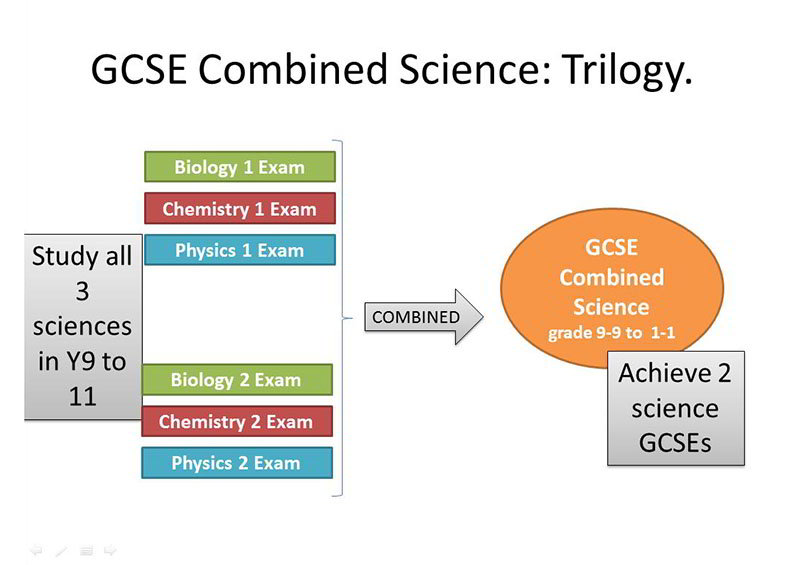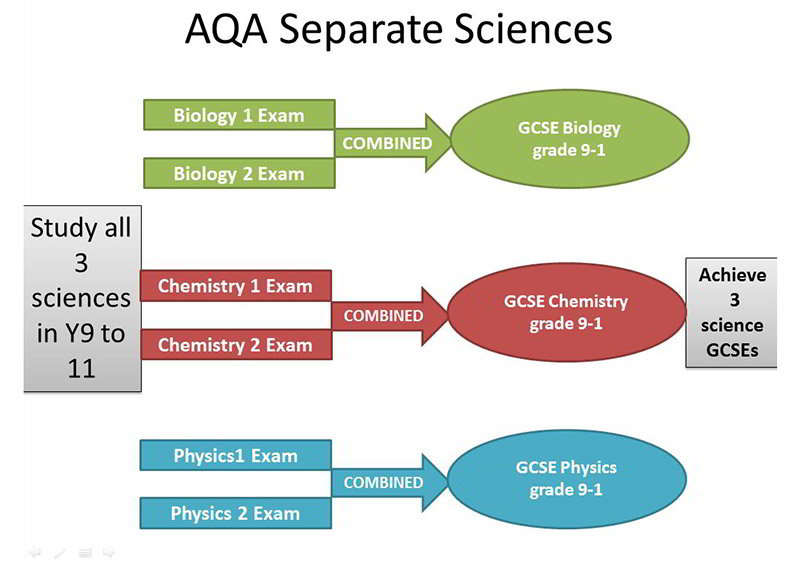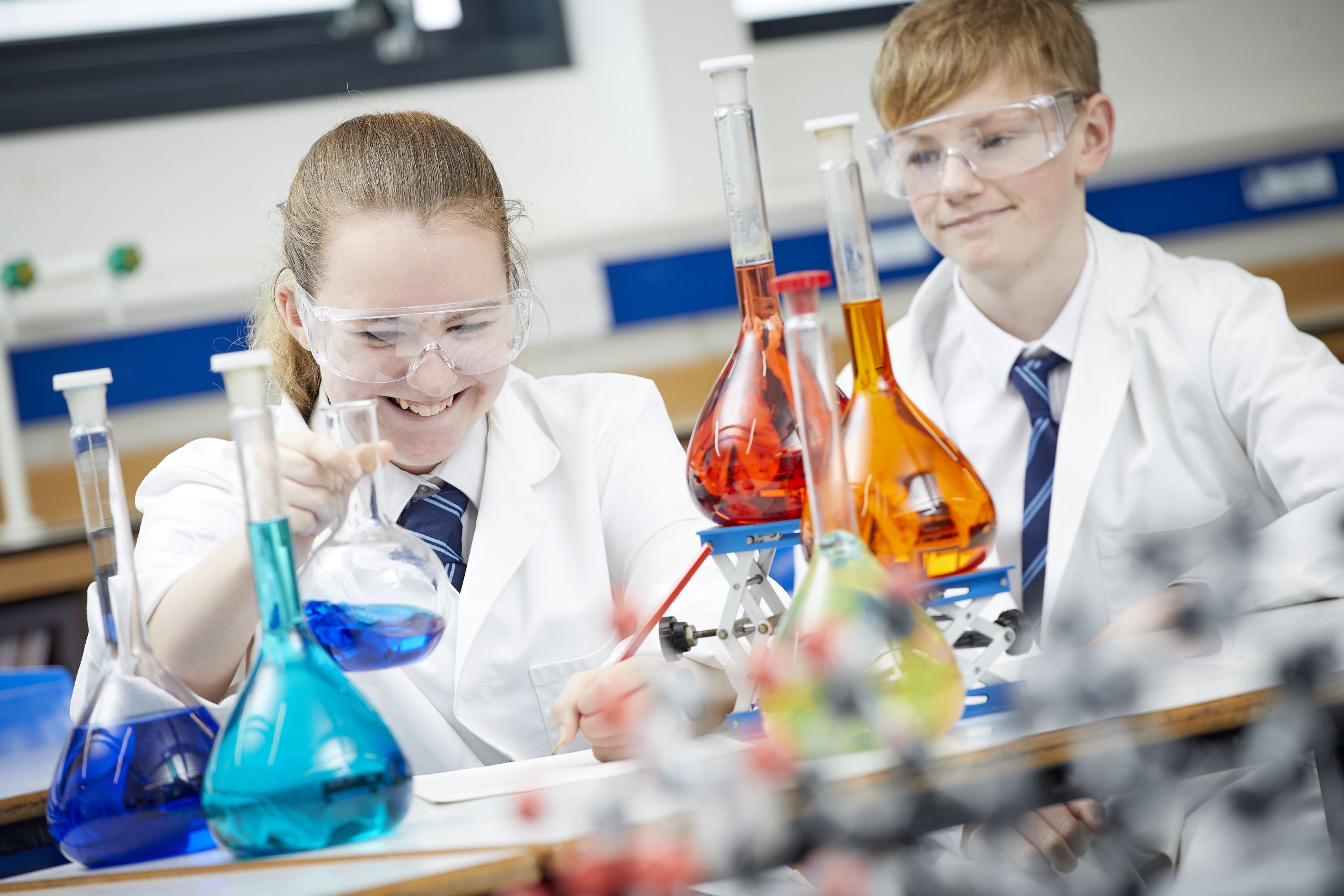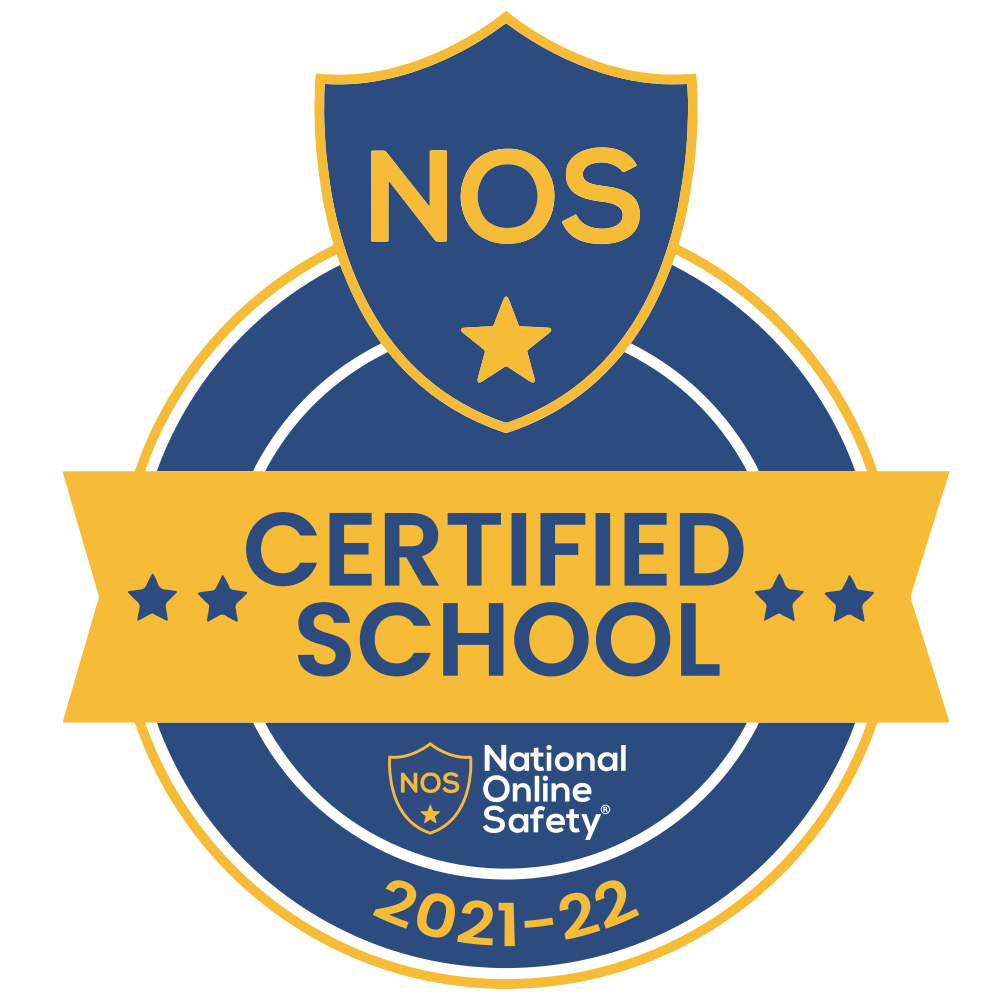Science
| Staff | Position |
|---|---|
| Mr Wobbaka | Associate Headteacher |
| Miss Parker | Director of Faculty |
| Mr Connolly | Deputy Head of Faculty |
| Mrs Benson | Assistant Head of Faculty |
| Mr Farmer | Teacher |
| Mr Harriott | Teacher |
| Miss Holmes | Teacher |
| Mr Johnson | Teacher |
| Mr Atkin | Teacher |
Key Stage 3
Students follow a two year Key Stage 3 science course based upon the National Curriculum. They study a wide range of topics across the disciplines of Biology, Chemistry and Physics in their science lessons. Students will develop new practical skills and scientific techniques, linking ideas to the world around them and developing their understanding of working scientifically. This course prepares students for continuing their scientific study at GCSE from Year 9.
| Year 7 | Year 8 |
| Introduction to science | Enquiry processes |
| Particles | Energy and waves |
| Separating mixtures | Breathing and digestion |
| Forces- speed and gravity | Elements and The Periodic Table |
| Electricity | Forces, Pressure and magnetism |
| Movement and cells | Chemical Reactions |
| Acids and alkalis | Earth and climate |
| Metals and non-metals | Respiration and photosynthesis |
| Energy | Evolution and inheritance |
| Light and sound | Enquiry processes |
| Ecology | |
| Reproduction | |
| Earth and Universe |
Additional resources to support learning in Key Stage 3 Science:
Encourage your child to:
● Use their outcome sheets and glossary booklets at home to follow up class work and consolidate their understanding. This gives a clear list of what students need to be able to do in each unit. Students should identify areas for improvement and then focus their revision.
● Attend lessons on time, follow all instructions and work hard to complete all of the work set in class to the best of their ability.
● Complete homework and catch up missed work.
A range of resources can also be found on:
BBC Bitesize - https://www.bbc.com/bitesize/subjects/zng4d2p
Kerboodle - https://www.kerboodle.com/users/login school login for username and institution code: ux6
Kerboodle help videos:
https://www.youtube.com/watch?v=41xzDhpA7Pc&list=PLW-Dpen99Aj6aBAFMSBTcERCu3JjkRovu&index=7
https://www.youtube.com/watch?v=gGmUgA88VKQ&list=PLW-Dpen99Aj6aBAFMSBTcERCu3JjkRovu&index=9
Collins revision and practice book: ISBN 978 0 00756 283 1
CGP study and practice book Higher tier: ISBN 978 1 84146 385 8
CGP study and practice book Foundation tier: ISBN 978 1 78908 067 4
Where required, passwords have been provided to students directly. For further support please contact the school.
Key Stage 4
GCSE Combined Science Trilogy Examination board: AQA Science Trilogy
GCSE Separate Sciences Examination board: AQA Biology AQA Chemistry AQA Physics
| Year 9 | Year 10 | Year 11 |
| B1 cell structure | B10 Human nervous system | B15 Genetics and Evolution |
| B2 cell division | B11 Hormonal control | B16 Adaptation, interdependence and competition |
| B3 organisation and digestive system | B12 Homeostasis in action (Bio only) | B17 Organising an ecosystem |
| B4 organising animals and plants | B13 Reproduction in action |
B18 Biodiversity and ecosystems |
| B5 Communicable disease | B14 Variation and Evolution | C12 Chemical analysis |
| B6 Preventing and treating disease | C8 Rates and equilibrium | C13 The Earth's Atmosphere |
| B7 Non communicable disease | C9 Crude oil and fuels | C14 The Earth's resources |
| B8 Photosynthesis | C10 Organic reactions (Chem only) | C15 Using our resources (Chem only) |
| B9 Respiration | C11 Polymers (Chem only) | P13 Electromagnetic Spectrum |
| C1 Atomic Structure | P8 Forces in balance | P14 Light |
| C2 The Periodic Table | P9 Motion | P15 Electromagnetism |
| C3 Bonding and structures | P10 Forces and motion | P16 Space (Phys only) |
| C4 Chemical calculations | P11 Forces and pressure (Phys only) | |
| C5 Chemical changes | P12 Wave properties | |
| C6 Electrolysis | ||
| C7 Energy changes | ||
| P1 Conservation and dissipation of energy | ||
| P2 Energy transfer by heating | ||
| P3 Energy resources | ||
| P4 Electrical circuits | ||
| P5 Energy in our home | ||
| P6 Molecules and matter | ||
| P7 Radioactivity |
Assessment:

GCSE Combined Science is worth 2 GCSEs.
The results from a student’s six science exams are combined to give an overall grade on a 17-point scale from “9-9” to “1-1”:
|
Higher Tier grade range |
Foundation tier grade range |
|||||||||||||||||
|
9-9 |
9-8 |
8-8 |
8-7 |
7-7 |
7-6 |
6-6 |
6-5 |
5-5 |
5-4 |
5-5 |
5-4 |
4-4 |
4-3 |
3-3 |
3-2 |
2-2 |
2-1 |
1-1 |
There is no controlled assessment; GCSE Combined Science is 100% exam-based.
Practical work is an integral part of the course, students must complete a set number of ‘required practicals’ throughout the course. Student’s understanding of these practicals and the accompanying techniques will be assessed in the exams.

These exams are different to those for Combined Science.
Students achieve 3 science GCSE grades in Biology, Chemistry and Physics on the 1 to 9 scale.
There is no controlled assessment, GCSE Sciences are 100% exam-based.
Practical work is an integral part of each course, students must complete a set number of ‘required practicals’ throughout each course. Student’s understanding of these practicals and the accompanying techniques will be assessed in the exam.
Encourage your son / daughter to:
Regularly review what they have been taught during their lesson time. They can do by this using a revision guide or an online website. We recommend BBC Bitesize and we subscribe to Kerboodle. They need to ensure that they prepare and revise for all assessments.
Additional resources to support learning in GCSE Science:
BBC Bitesize – Biology Revision
BBC Bitesize – Chemistry Revision
BBC Bitesize – Physics Revision
https://www.kerboodle.com/users/login
We also recommend the purchase of revision guides through the school to further assist students’ work outside the classroom.
Where required, passwords have been provided to students directly. For further support please contact the school.
Sixth Form Courses
A Level Biology (AQA)
Aims of the course:
To encourage students to develop essential knowledge and understanding of different areas of Biology and how they relate to each other, to develop and demonstrate a deep appreciation of the skills, knowledge and understanding of scientific methods. Develop competence and confidence in a variety of practical, mathematical and problem solving skills and to develop their interest in and enthusiasm for the subject, including developing an interest in further study and careers associated with the subject. As well as to understand how society makes decisions about scientific issues and how the sciences contribute to the success of the economy and society.
Course Content:
The topics covered are 1. Cell biology, 2, Organisation, 3. Infection and response, 4. Bioenergetics, 5. Homeostasis and response, 6. Inheritance, 7. variation and evolution, 8. Ecology as well as Key ideas.
Assessment:
The A level course is assessed by 100% examination as 3 papers. Paper 1 includes content from topics 1– 4, including relevant practical skills written exam: 2 hours worth 35% of A-level. Paper 2 includes content from topics 5 – 8, including relevant practical skills written exam: 2 hours worth 35% of A-level. Paper 3 covers any content from topics 1– 8, including relevant practical skills, written exam: 2 hours worth 30% of A-level.
Encourage your son /daughter to:
Carry out regular independent study at home. Students are loaned textbooks and revision guides to support their self study. They are provided with a full lesson by lesson overview of the course to enable them to pre read before lessons as well as follow up lesson with exam questions . We regularly set past paper questions to prepare them for the demands of the A level examinations. All students also have access to Kerboodle an online revision resource.
Where required, passwords have been provided to students directly. For further support please contact the school.
A Level Chemistry (AQA)
Aims of the course:
The course encourages students to develop their interest in and enthusiasm for chemistry including developing an interest in further study and careers associated with the subject. They will use theories, models and ideas to develop scientific explanations, use knowledge and understanding to pose scientific questions, define scientific problems, present scientific arguments and scientific ideas, use appropriate methodology, including information and communication technology (ICT), to answer scientific questions, carry out experimental and investigative activities, analyse and interpret data to provide evidence, recognising correlations and causal relationships, evaluate methodology, evidence and data, and resolve conflicting evidence.
Course content:
Inorganic chemistry, organic chemistry, physical chemistry including atomic structure, amount of substance, bonding, energetics, acids and bases, redox, kinetics.
Assessment:
The A level course is assessed by 100% examination as 3 papers. Paper 1 includes content from physical and inorganic chemistry, including relevant practical skills written exam: 2 hours worth 35% of A-level. Paper 2 includes content from physical and organic chemistry, including relevant practical skills written exam: 2 hours worth 35% of A-level. Paper 3 covers any content from all topics, , including relevant practical skills, written exam: 2 hours worth 30% of A-level.
Encourage your son /daughter to:
Carry out regular independent study at home. Students are loaned textbooks and revision guides to support their self study. They are provided with a full lesson by lesson overview of the course to enable them to pre read before lessons as well as follow up lesson with exam questions . We regularly set past paper questions to prepare them for the demands of the A level examinations. All students also have access to Kerboodle an online revision resource.
Where required, passwords have been provided to students directly. For further support please contact the school.
A Level Physics (AQA)
Course content:
The course contains units on Measurements and their errors, Particles and radiation, Waves, Mechanics and materials, Electricity, Further mechanics and thermal physics , Fields and their consequences, Nuclear physics and Option unit is Turning points in physics.
Assessment:
The A level course is assessed by 100% examination as 3 papers. Paper 1 includes content from section 1-5, including relevant practical skills written exam: 2 hours worth 34% of A-level. Paper 2 includes content from sections 6-8, including relevant practical skills written exam: 2 hours worth 34% of A-level. Paper 3 covers any content from all topics and an option section including relevant practical skills, written exam: 2 hours worth 32% of A-level.
Encourage your son /daughter to:
Carry out regular independent study at home. Students are loaned textbooks and revision guides to support their self study. They are provided with a full lesson by lesson overview of the course to enable them to pre read before lessons as well as follow up lesson with exam questions . We regularly set past paper questions to prepare them for the demands of the A level examinations. All students also have access to Kerboodle an online revision resource.
Where required, passwords have been provided to students directly. For further support please contact the school.
Applied Science (BTEC)
Aims of the course:
Applied Science covers aspects of all three sciences, but with an approach which is more vocational. Along with the scientific knowledge acquired throughout the course students will also build the skills necessary to gain employment in a scientific workplace. This includes general skills such as report writing and meeting deadlines, along with more specialised practical techniques and health and safety procedures.
Course content:
|
BTEC Level 3 Extended Certificate in Applied Science (1 year) |
BTEC Level 3 Diploma in Applied Science (2 years) |
|
Unit 1 – Principles and Applications of Science I Unit 2 – Practical Scientific Procedures and Techniques Unit 3 - Science Investigation Skills Unit 8 – Physiology of Human Body Systems |
The units studied for the Extended Certificate plus: Unit 4 - Laboratory Techniques and their Applications Unit 5 - Principles and Applications of Science II Unit 6 - Investigative Project Unit 14 – Applications of Organic Chemistry |
Assessment:
Units 1 & 5 – External Exams
Unit 1 comprises three 40 minute exams amd unit 5 three 50 minute exams. Both unit 1 and 5 are divided into Biology, Chemistry and Physics topics.
Unit 3 – Assessed practical work and linked exam Students have a period of 3 hours to complete a practical set by the exam board which is subsequently followed up by a 90 minute exam based around the experiment they have carried out and general investigative skills.
Units 2, 4, 6, 8 & 14 – Assessed coursework.
These assignments are internally assessed by staff and take a variety of forms such as reports, investigative write-ups and presentations.
Encourage your son /daughter to:
Use the eBook available on Pearson ActiveLearn to support and enhance your work
Revise for examined units using the revision guide which you will be allowed to borrow from the school for the duration of your studies.
Read through all assignment briefs thoroughly to ensure work is completed to the correct standard prior to submission.
Where required, passwords have been provided to students directly. For further support please contact the school.






